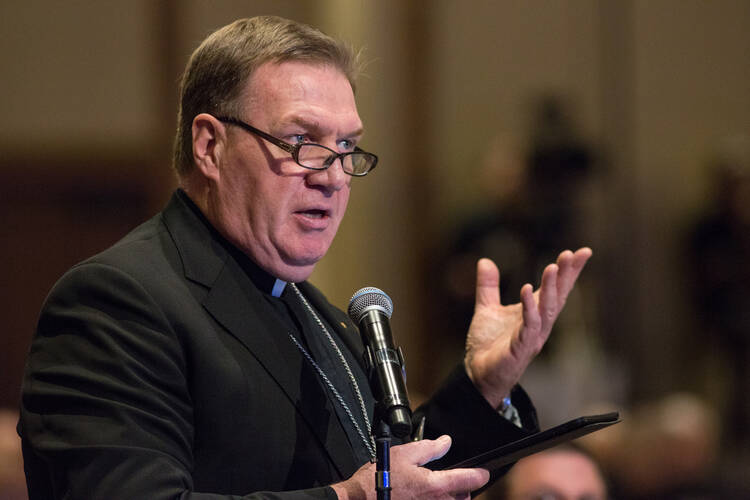In yet another decisive move to reshape and give a new direction to the church in the United States, Pope Francis has appointed Cardinal-elect Joseph (“Joe”) Tobin, 64, a man of simple lifestyle, committed to dialogue, encounter and the poor, as the new archbishop of Newark.
The Vatican announced this at midday, Nov. 7, confirming the news that was broken some days earlier in the United States. It said the pope accepted the resignation presented by Archbishop John J. Myers and appointed Archbishop Tobin of Indianapolis to succeed him.
RELATED: Cardinal-designate Tobin Will Focus on Dialogue, Discernment
At the time of his appointment, the Detroit-born archbishop was the leader of the archdiocese of Indianapolis with its 250,000 faithful, which he had served since Oct. 2012. He now moves to the much larger Archdiocese of Newark, whose 1.2 million faithful have suffered many trials in recent years during the leadership of Archbishop John Myers, who now retires having reached the age of 75 last July.
Francis understood well that this diocese needed a new style of leader, and he found the man in Joseph Tobin, C.Ss.R., a member of the Congregation of the Most Holy Redeemer, better known as the Redemptorists, a Catholic missionary order of priests and brothers founded by St. Alphonus Maria de Liguori in 1749.
Francis and the archbishop first met at the 2005 Synod of Bishops on the Eucharist where they were together in the same Spanish-language working group. Archbishop Tobin speaks Spanish and Italian fluently and for several years exercised his ministry among the Hispanic community in Detroit and Chicago. He is a man who governs with prudence and has good administrative skills as was seen in Indianapolis. These qualities first emerged clearly during his 19 years (1991-2010) in the top leadership positions of the Redemptorist order in Rome to which he was elected, first as consultor general and then for two consecutive terms (1997-2009) as superior general of an order that has missions in 77 countries and all continents.
During his tenure as superior general he visited these missions. He said he went “not as a cop” but to dialogue in depth with his confreres in the different countries and to understand their situations and needs. In the process, he developed great sensitivity to the different cultures and ethnic groups and gained a global vision of the church. These qualities were further enriched by his work in the International Union of Superior Generals in Rome and were fine-tuned even more during his two years (2010-12) in the number two position in the Vatican’s Congregation for Consecrated Life.
In those years in Rome as superior general, Archbishop Tobin got to know well Cardinal Joseph Ratzinger, then prefect of the Congregation for the Doctrine of the Faith, because he had to discuss and defend Redemptorist theologians, including the famous German moral theologian Bernard Haring. These theologians, Archbishop Tobin said in an interview with Salt and Light TV, “came on the radar” of the C.D.F. because they were “advocating on the part of weak and limited human beings” and sometimes “would push the envelope further than the Holy See would like.” In those delicate conversations, Archbishop Tobin, who insisted that he was not a professional theologian, gained the respect of the future pope who came to see him as a man of dialogue, reconciliation and who listens to women.
After completing his term as superior general, Archbishop Tobin went to Oxford for a sabbatical year. But in August 2010, while on holiday in Canada painting his mother’s house, he received a phone call from Cardinal Tarcisio Bertone, then Vatican secretary of state, informing him that Pope Benedict XVI wished to appoint him as secretary of the Vatican’s Congregation for Consecrated Life. After giving it some thought, he accepted but later learned that his name was not on the list of names given to the pope for that post. It is understood that Benedict XVI tapped Archbishop Tobin because of his earlier positive experience with him.
The congregation oversees the work of the almost one million consecrated women and men in the Catholic Church, and some months after Archbishop Tobin’s arrival, Benedict appointed the Brazilian archbishop (later cardinal), João Braz de Aviz, to lead it. Serving as number two, Archbishop Tobin developed a very close relationship with the new prefect. But the Brazilian was not able to protect him in 2012, when several hardline prelates in Rome and in the United States, unhappy at the archbishop’s reconciling stance during the Vatican’s visitation and investigation into the Leadership Conference of Women Religious, pushed for his removal. His work was having a positive impact but their push caused Benedict XVI to assign him to the archdiocese of Indianapolis in Oct. 2012. It was a difficult moment for Archbishop Tobin, but he accepted it with dignity and grace.
His period as archbishop in Indianapolis is well known, including his clash with the Governor Mike Pence of Indiana over the archdiocese’s decision to accept Syrian immigrants.
Last year, Pope Francis appointed the archbishop to the board of the Congregation for Consecrated Life. But the Jesuit pope sprung two major surprises on the U.S. church in recent weeks, first by naming Tobin as a cardinal and now by appointing this media-savvy pastor to Newark to encourage and revitalize the Catholic community in that archdiocese.
The new archbishop and cardinal-elect was born in Detroit, Michigan, May 3, 1952. He lived there until the age of 19 when his family moved to Canada. One of 13 children, he was baptized by a Redemptorist priest, grew up in a Redemptorist parish near his home and was so inspired by the Redemptorist style of ministry that he decided to join this order of priests and brothers whose mission is “to strive to imitate the virtues and examples of Jesus Christ, our Redeemer, consecrating themselves especially to the preaching of the word of God to the poor.”








